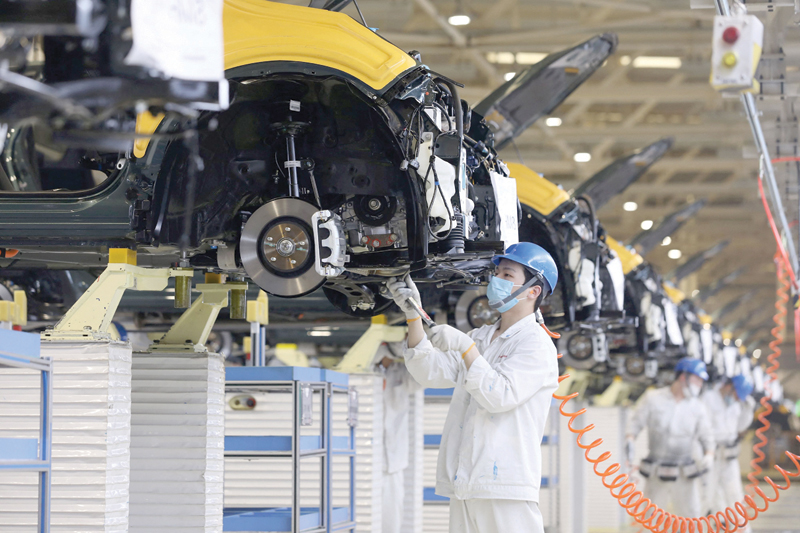

BEIJING: China’s economic recovery quickened sharply in the first quarter to record growth of 18.3 per cent from last year’s deep coronavirus slump, propelled by stronger demand at home and abroad and continued government support for smaller firms.
But the brisk expansion, heavily skewed by the plunge in activity a year earlier, is expected to moderate later this year as the government turns its attention to reining in financial risks in overheating parts of the economy.
While the jump in gross domestic product (GDP) undershot the 19 per cent forecast by economists in a Reuters poll, the official data showed it was the fastest growth since quarterly records began in 1992 and up from 6.5 per cent in the fourth quarter last year.
“The upshot is that with the economy already above its pre-virus trend and policy support being withdrawn, China’s post-Covid rebound is levelling off’’, said Julian Evans-Pritchard, senior china economist at Capital Economics. “We expect quarter-on-quarter growth to remain modest during the rest of this year as the recent boom in construction and exports unwinds, pulling activity back towards trend.”
Aided by strict virus containment measures and emergency relief for businesses, the economy has recovered from a steep 6.8 per cent slump in the first three months of 2020, when an outbreak of Covid-19 in the central city of Wuhan rapidly became a crippling pandemic that has killed about 3 million worldwide.
China’s rebound has been led by exports as factories raced to fill overseas orders and more recently a steady pickup in consumption as shoppers returned to restaurants, malls and car dealerships.
Retail sales increased 34.2 per cent year-on-year in March, beating a
28.0 per cent gain expected by analysts and stronger than the 33.8 per cent jump seen in the first two months of the year.
Other data, however, showed a moderation in expansion with quarter-on-quarter growth slowing to 0.6 per cent in January-March from a revised 3.2 per cent in the previous quarter, missing expectations for a 1.5 per cent increase. Factory output grew 14.1 per cent year-on-year in March, slowing from a 35.1 per cent surge in the January-February period and lagging a forecast 17.2 per cent rise.
National Bureau of Statistics spokeswoman Liu Aihua told a news conference on Friday while the economy started 2021 on a firm footing, the services sector and smaller firms still faced challenges, while consumer inflation was likely to remain moderate.
Data last week showed consumer prices rising at only a modest pace in March, even as factory gate inflation hit a near three-year high.
“Looking forward, the trend of normalisation may continue for the rest of the year, and domestic consumption is expected to be the major growth driver’’, said Chaoping Zhu, global market strategist at J P Morgan Asset Management in Shanghai.
“In terms of policy response, the central bank and fiscal authorities are returning to a more neutral stance, although some selective measures might be continued in order to support the small and medium-sized enterprises.”
Li Wei, economist at Standard Chartered in Shanghai, expected second-quarter growth to slow to 7 per cent.
The world’s second-largest economy is expected to grow 8.6 per cent in 2021, according to a Reuters poll, which would easily beat the government’s 2021 annual growth target of above 6 per cent.
China’s GDP grew just 2.3 per cent rise last year, its weakest expansion in 44 years but still making it the only major economy to avoid contraction as other industrial powers struggled with the pandemic hit.
With the economy back on a more solid footing, China’s central bank is turning its focus to cooling credit growth to help contain financial risks.
However, it is treading cautiously to avoid derailing the recovery with policymakers vowing not to make any sudden policy shifts.
Authorities are especially concerned about financial risks involving the country’s overheated property market and have asked banks to trim their loan books this year to guard against asset bubbles. — Reuters
Oman Observer is now on the WhatsApp channel. Click here



